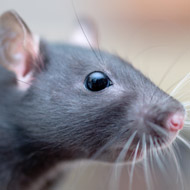Gene therapy restores hand function in rats with spinal cord injury

Researchers gave the gene therapy to rats with spinal cord injuries that resembled the type humans develop after traumatic impacts.
Researchers from King’s College London have used a new kind of gene therapy to restore hand function in rats with spinal cord injuries.
The study tested a kind of gene therapy that could be switched on and off using a common antibiotic. Professor Elizabeth Bradbury from the Institute of Psychiatry, Psychology & Neuroscience (IoPPN) said the discovery means that scientists can now precisely control how long a therapy is delivered using a gene ‘switch’.
“This means we can hone in on the optimal amount of time needed for recovery,” she said. “Gene therapy provides a way of treating large areas of the spinal cord with only one injection, and with the switch, we can now turn the gene off when it is no longer needed.”
Following a traumatic injury to the spine, dense scar tissue forms, preventing new connections being made between nerve cells. The gene therapy causes cells to produce an enzyme called chondroitinase which can break down this scar tissue and allow networks of nerve cells to regenerate.
In the study, researchers gave the gene therapy to rats with spinal cord injuries that resembled the type humans develop after traumatic impacts, such as falls or car crashes.
They found that when the gene therapy was switched on for two months, the rats were able to accurately reach and grasp sugar pellets. They also found a dramatic increase in activity in the spinal cord of the rats, suggesting that new connections had been made in the networks of nerve cells.
To overcome the problem of the immune system recognising and removing the switch mechanism, the researchers added a ‘stealth gene' to hide the switch from the immune system.
"The use of a stealth gene switch provides an important safeguard and is an encouraging step toward an effective gene therapy for spinal cord injury," said Professor Joost Verhaagen from the Netherlands Institute for Neuroscience." This is the first time a gene therapy with a stealth on/off switch has been shown to work in animals."
Further research is now underway to prepare the gene therapy for trials in larger species.



 RCVS Knowledge has welcomed Professor Peter Cockcroft as editor-in-chief for Veterinary Evidence.
RCVS Knowledge has welcomed Professor Peter Cockcroft as editor-in-chief for Veterinary Evidence.